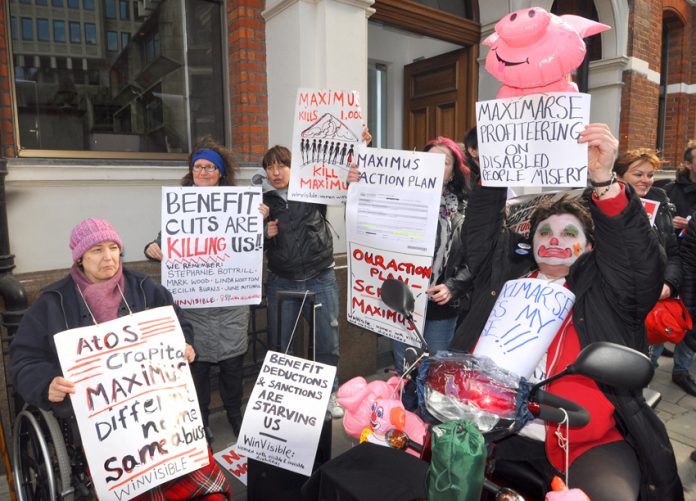
UP TO one hundred trade unionists, disabled campaigners and their supporters demonstrated yesterday outside Maximus, the company who have taken over the work-capability assessment, previously carried out by ATOS.
They shouted: ‘Maximus out! Maximus out!’ and blocked the traffic outside St James’s Park Station, in central London.
In 2007, Maximus settled out-of-court with the US Federal government for a Medicaid Card Insurance Fraud case for $30.3 million.
In 2013, Richard A Montoni, the CEO of Maximus in the USA got a salary and compensation package of $5 million.
Ellen Clifford from Disabled People Against Cuts (DPAC) told News Line: ‘Welfare reform continues to kill. It punishes the disabled and poorest while private companies like Maximus are profiting from public money.
‘In the UK many disabled people have suffered on the work programme. One of those attending a job search session at Maximus asked for a glass of water and was told he could not have one until he finished his job search on the computer otherwise he would be sanctioned.’
TSSA rep Josey Grimshaw told News Line: ‘My disabled brother had to face the ATOS test even though he has Fibromyalagia and an ileostomy bag and was refused benefits by ATOS.
‘He was signed off as sick by his own doctor, appealed and had some of his benefit reinstated.’
A Unite community member Eleanor Firmin from Walthamstow said: ‘I am here to demand that they stop the work capability assessments.
‘They are trying to divide working class people and punishing the most vulnerable in society.’
•The cost to claimants of having their social security payments stopped under this government’s controversial sanctions regime has rocketed by 3,000%, analysis by the Public and Commercial Services union shows.
Using Department for Work and Pensions data, the union has calculated the value of jobseeker’s allowance payments sanctioned in the year to September 2014 (the latest for which figures are available) was £355 million, compared to £11 million in 2009/2010.
This massive rise explains why sanctions have been so closely linked to the increase in the use of foodbanks, the union says.
The new figures came ahead of a Dispatches investigation broadcast yesterday evening into the government’s sanctions regime that was stepped up in October 2012.
Under the stricter system, the length of time sanctions can be imposed for has increased, with the minimum set at four weeks, rising to 13 weeks and up to three years.
PCS general secretary Mark Serwotka said: ‘This government is imposing much harsher penalties on people who rely on social security at the same time as seeking to blame and vilify them for being out of work.
‘Sanctions do nothing to help unemployed people find sustainable jobs. They only poison the relationship between claimants and jobcentre staff, and they should be scrapped immediately.’